- Home
- Louis Sachar
Dogs Don't Tell Jokes Page 2
Dogs Don't Tell Jokes Read online
Page 2
“What?”
The woman next to him set her box down on the counter.
“For the talent show,” said Gary. “I want to be in the talent show.”
“So?”
“So, how do I sign up for it?”
“I don’t know.”
“Can you ask somebody?”
Mrs. Walls sighed, then headed to the back of the office. She returned a moment later. Nobody in the office seemed to know—or care, for that matter. All anyone seemed interested in was why Gary wasn’t in class where he belonged.
“All I want to do is sign up for the talent show,” he said aloud as he headed to class. Around him, posters urged him to be in the show and show off his talents. First prize would be a one-hundred-dollar savings bond. Second prize would be a twenty-five-dollar gift certificate at Zulu’s Records and Tapes. And third prize would be two free sundaes at Maurecia’s Ice Cream Parlor.
But none of the posters said where or how to sign up for it.
DON’T BE COOL!
MAKE A FOOL
OUT OF YOURSELF
IN THE TALENT SHOW!
“I know I can do that,” he said.
He learned the talent show would be on November 16. He couldn’t remember today’s date, but he knew the month was October. He figured he had about a month to get ready.
“It’ll probably take me that long just to sign up for the stupid thing,” he grumbled.
Mrs. Carlisle glanced at him but didn’t say anything when he walked in late. The date was on the board: Tuesday, October 23. He figured it out at the desk. At first he didn’t know if October had thirty or thirty-one days, but then he remembered Halloween was October 31. The talent show would be on a Friday. He had exactly three weeks and three days.
He spoke to Mrs. Carlisle after class. “Do you know where you’re supposed to sign up for the talent show?”
Mrs. Carlisle didn’t seem to understand the question. “The show is for students, not teachers,” she said.
“I know. I want to be in the show. Do you know who I’m supposed to tell? I’m not supposed to just walk up on stage without telling anyone, am I?”
“I wouldn’t think so,” said Mrs. Carlisle, but she didn’t know whom he was supposed to tell.
“So’d you hear?” he asked. “They’re not making pencils any longer.”
“Pardon?”
“They’re long enough already!”
Gary sat at his desk in math, looking at Miss Langley but not really listening. It was beginning to feel like a bad dream—one where he just wanted to do something simple, like open his locker, but for some reason could never get it done.
He decided he’d wait until fifth period, gym, and talk to Joe Reed. Joe would know.
“Gary,” said Miss Langley as Gary was leaving math class. “The homework assignment is on the board.”
He glanced at the board. He knew it was there. He’d already written it down. She didn’t have to keep telling him every single day.
“What does she think I am—stupid?”
Outside at recess, he decided he couldn’t wait until fifth period. What if it was too late? What if Joe was absent?
He spotted Ira Feldman sitting on a planter, looking at his baseball cards.
“Hi, Ira,” said Gary.
“Goon,” Ira muttered, then looked back at his baseball cards. Ira owned more than a thousand baseball cards, but for some reason had chosen to bring a certain eight of them to school.
“So’d you hear?” asked Gary. “After this year, they’re not making bats any longer.”
“What? That’s crazy. Aluminum bats are no good. Even if you’re jammed, you can still get a solid hit. That’s—”
Gary had no idea what Ira was talking about. He hadn’t said anything about aluminum or wooden bats. “They’re long enough already!”
“Huh?”
“They’re not making bats any longer. They’re long enough already.”
Ira proceeded to explain to Gary how different players liked different-sized bats. Rod Carew, for example, used a very short bat, whereas Willie Stargell used a big bat.
Gary nodded along. He didn’t know who any of these people were. “So,” he said, “do you know anything about the talent show?”
“No, not really.”
“Do you know where you’re supposed to sign up for it?”
Ira shrugged.
“It’s not too late, is it?”
Ira didn’t know that, either.
Gary wished he could talk to Angeline. She’d know about the talent show. It didn’t matter that she was a thousand miles away in another school. Somehow, she’d know.
Paul Wattenburg, Ryan Utt, and Matt Hughes were sitting on the grass.
“If April showers bring May flowers, what do May flowers bring?” asked Gary.
“Your butt,” said Ryan.
“What do you want, Goon?” asked Paul.
“Have you seen Joe Reed?” he asked.
“Yeah, I’ve seen him,” said Matt. “I saw him yesterday.”
Paul and Ryan laughed.
“So, I was wondering,” said Gary, “do you know where you’re supposed to sign up for the talent show?”
“Yeah, on your butt,” said Ryan.
(Evidently, butt was Ryan Utt’s favorite word. Probably because it rhymed with his last name.)
“What do you want, Goon?” Paul asked again.
He had just told them. He wanted to sign up for the talent show. “I want to be in the talent show.”
“You gonna dance?” asked Matt.
Matt’s friends laughed.
“The Dance of the Goon!” said Matt.
They laughed again.
“I’m going to tell jokes,” said Gary.
“Well, let’s hear one,” Paul urged.
Gary thought a second. “What do you call a cow without legs?”
They stared at him.
“Ground beef.”
They stared at him.
“You better stick to dancing,” said Matt.
“Every morning when I wake up,” said Ryan Utt, “the first thing I do is thank the Lord I’m not Gary Boone.”
Gary felt a hand on his shoulder. A girl said, “Gary.”
He turned around to see Brenda Thompson.
It was probably the first time Brenda Thompson had ever spoken to him. It was certainly the first time she’d ever touched him.
“Did you say you wanted to be in the talent show?” Brenda asked. She seemed genuinely interested.
“If I’m not too late.”
“See Miss Langley,” said Brenda. “She’s the faculty adviser.”
“Thanks, Brenda,” said Gary.
“Thanks, Brenda,” said Paul in a mocking voice, although it was more like he was making fun of Brenda than of Gary.
“Ooooh,” said Matt, as if there was something going on between Brenda and Gary.
The boys thought that was hilarious.
Brenda looked scornfully at them. “Get real,” she said.
The talent show had been Brenda Thompson’s idea. “It’ll be fun,” she’d said at the student council meeting.
“I think it sounds stupid,” said Philip Korbin, eighth-grade president. “Only an idiot would want to make a fool out of himself in front of the whole school.”
“Oh, it’ll be fun,” Brenda said again.
Most everybody agreed with Philip, but in the end they voted for the talent show because Brenda was popular, and because nobody else had a better idea for celebrating Floyd Hicks’s birthday.
But the real reason Brenda had suggested the talent show wasn’t because she thought it would be “fun.” She just wanted a chance to sing on stage. She imagined herself as the next Madonna.
She never admitted this to anyone. She thought she would say something like, “Well, I guess I should be in the talent show, since it was my idea. Hmm, what should I do? I don’t know. I guess I’ll sing.”
And it just
so happens that on the day of the talent show, a big-time Hollywood producer gets a flat tire while driving through town in his Lamborghini. And while the tire is being fixed he notices a poster for the talent show, so, since he has nothing better to do, he checks it out. When he hears Brenda sing, he immediately rushes backstage and signs her up to do records and movies.
She doesn’t even go back to school She just hops in his red convertible and heads straight for Hollywood with the wind blowing her hair.
“There’s only one problem,” he says. “It’s your name. Brenda Thompson. It’s so ordinary.”
“I know what you mean,” she agrees. “I’ve always hated it.”
“How about if we call you Ruby Goldmine?”
“I love it!”
But all Brenda’s daydreams were about to go up in smoke, because the last time she had checked, not one single person had signed up to be in the talent show. She herself wasn’t going to sign up for it until some other kids did first.
Imagine how embarrassing it would be, she thought, if she was the only one in the talent show.
When recess ended, Gary was waiting by the door to Miss Langley’s room.
“Gary? What are you doing here?”
“I want to be in the talent show,” he blurted, almost shouting.
Miss Langley smiled. “Okay,” she said quietly.
They went inside. She handed him a clipboard with a piece of paper attached to it. “Sign your name on the list, and next to it put down what you’re planning to do in the show.”
Gary looked at the blank piece of paper. “There are no other names here.”
“You’re the first,” said Miss Langley.
He smiled as all his worries vanished. He no longer even knew why he had been so worried. After all, there was no reason why he shouldn’t be able to sign up for the talent show, just like anybody else.
He held the clipboard high over his head.
“What are you doing?” asked Miss Langley.
“I’m signing up!” he said.
He wrote:
Gary W. Boone Tell jokes
(Gary’s middle name was Arthur.)
5.
Why did the boy wear a diaper to the party?
Because he didn’t want to be a party pooper.
No matter how many times Gary read it, that joke always made him laugh.
He was sitting in his room going through one of his jokebooks. There were twenty-eight books in Gary’s bookcase. Twenty-five of them were jokebooks. He also had a dictionary, a book called Sideways Arithmetic from Wayside School, which he didn’t understand, and a novel about a pirate that Angeline had given him a long time ago and that he’d never read.
“Can I say ‘pooper’ at school?” he asked aloud.
On the walls of his room were posters of famous comedians: W. C. Fields playing poker, Woody Allen playing the clarinet, Whoopi Goldberg jumping in the air, and one of Robin Williams and Jonathan Winters standing side by side, each trying to look sillier than the other.
He’d once noticed that many of his favorite comedians had a name that began with the letter W. That was why he always signed his name Gary W. Boone. If anybody asked, he would say his middle name was Wolfgang, but nobody ever asked.
“Maybe,” he considered, “I could get up on stage wearing a diaper! ‘Hi, my name is Goon. It’s wonderful to be here today.’ Everybody would already be laughing because of the diaper. ‘You’re probably wondering why I’m wearing this diaper.’ (Pause: One … two … three.) ‘I don’t want to be a party pooper!’ ”
He had once watched a television show where four real comedians talked about how to be a stand-up comic. They all agreed that timing was the most important factor. You should never rush your punch line. As one of the comedians said, “No matter how funny a joke was, it would bomb like a rotten egg if the timing wasn’t right.” He said that he always paused and counted to three before delivering the punch line.
“Would I really wear a diaper to school?” Gary asked. He shrugged. “Sure, why not?”
Except it wasn’t a party, it was a talent show. So party pooper wouldn’t make sense. “Or maybe that would just make it even funnier?” He’d have to think about it.
He continued to look through the jokebook.
Why shouldn’t you write on an empty stomach? Because it’s better to write on paper.
He wondered how many jokes he’d need. He didn’t know how much time he’d have. Normally, a stand-up comic has to fill eight minutes, but it might be different for a school talent show. He didn’t know how long it took for him to tell a joke. And how much time should he allow for laughter?
How do you tell a rooster from a hen?
You toss some corn on the ground.
If he eats it, he’s a rooster.
If she eats it, she’s a hen.
Of course, there was more to it, he realized, than just looking through jokebooks and finding fifteen or twenty funny jokes. The jokes had to be related. One joke had to lead into the next. “Segue” was what the real comedians had called it.
So, after the joke about the hen, he thought he could tell jokes about other animals. “Speaking of animals, did you hear about the frog-jumping contest? My father won.” (Pause: One … two … three.) “He was able to jump over thirty-five frogs.”
In his jokebook it was someone named Mr. Jones who jumped over thirty-five frogs, but on television the comics had all agreed it was best to personalize your jokes. You should use members of your family whenever possible.
It was too bad, he thought, that he wasn’t old enough to have a mother-in-law. Then he could say his mother-in-law won the frog-jumping contest.
“But seriously, folks, everyone in my family is a good jumper. In fact, I myself can jump higher than my house. I can jump three feet high.” (Pause: One … two … three.) “My house can’t jump at all!”
No, instead of saying he could jump three feet high, he realized, it would be better if he just jumped up, right there on stage. It’s better if a stand-up comedian is able to move around and do things, rather than just stand up.
What do you do when your nose goes on strike?
Gary’s heart jumped as he heard someone enter his room. He slowly closed his jokebook.
“What are you doing?” asked his mother.
He turned around and smiled at her. His parents had a rule. He wasn’t allowed to look at his jokebooks until he finished all his homework.
“I don’t suppose that’s schoolwork,” his mother said.
“Sort of,” said Gary. “It is for school.”
People always told Gary he looked exactly like his mother, which bothered him a little bit, not because his mother wasn’t nice-looking, but because he didn’t want to look like a forty-four-year-old woman. They had the same round face and wide mouth. Their noses were just a bit flat, and they both had small darting eyes.
He told her about the talent show.
“I think that’s wonderful,” his mother said in a way that didn’t sound like she thought it was wonderful.
“First prize is a hundred dollars!” said Gary.
His mother wasn’t impressed. “I hope you win,” she said. “But your homework comes first. Otherwise I’m going to take all those stupid jokebooks and throw them in the trash. I’m not kidding.”
“But this is really important,” said Gary. “It’s just as important as any of my other school-work. In fact, it’s more important. It is! When I grow up, I’m going to be a stand-up comic. I won’t need to know history or math for that.”
“That’s fine,” said his mother. “But right now, I don’t want you looking at a jokebook until you finish your homework.”
“You know, you’re really going to feel silly one day when I’m a famous comedian.”
His mother smiled. “I hope you’re right,” she said. This time she sounded like she really did hope he was right, like maybe it was his only hope.
“So, Mom,” he said. “What do
you do when your nose goes on strike?”
His mother had already started out the door. “Picket,” she answered without turning around.
She’d heard it before. She’d heard them all before.
6.
Joe Reed put his hands on Gary’s shoulders and looked him straight in the eye. “Are you going to play seriously,” he asked, “or are you going to clown around?”
“I’ll play,” Gary promised.
“All right!” said Joe as he clapped his hands together.
Gary clapped his hands together too.
Gary liked Joe. He was popular, and a great athlete, but he still treated everyone fairly, even Goon.
Joe was the captain of Gary’s flag football team in gym class. For flag football, every player on the team wore a special belt over his gym shorts, with “flags” attached by Velcro. The flags were long plastic strips. Instead of tackling someone, you were supposed to pull one of his flags.
The team huddled around Joe.
Gary had just pretended to pledge allegiance to Joe’s flag, which was why Joe asked him if he was going to play or clown around.
Joe looked at Gary. “Can you catch?”
Gary nodded confidently.
“Good,” said Joe. “They’re not even guarding you. I’ll fake a hand-off to Brian, then—”
“I can catch colds,” said Gary.
Joe stopped and stared at him. “Can you catch a football?”
Gary tried to think of a funny answer. “With my feet?” he asked.
Joe looked away.
“With your hands, Goon!” said Brian.
“Then why is it called a football?” asked Gary. “Why isn’t it called a handball?”
Joe called the play. “All right, Brian, I’ll fake it to you, then you flair out to the left flat. Doug and Zack will crisscross over the middle.”
“What about me?” asked Gary.
“Hike the ball,” said Joe. “On two.”
“Yessir!” said Gary. He saluted his captain.
Gary bent down over the ball. On the count of two, he hiked the ball between his legs to Joe. Joe threw it to Zack, who caught it and ran in for a touchdown.
“All right!” Joe cheered. He patted Gary on the back. “Nice hike, Goon. That was good.”

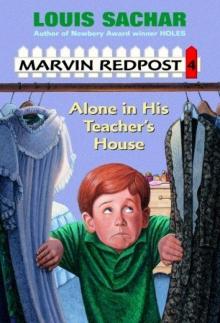 Alone in His Teacher's House
Alone in His Teacher's House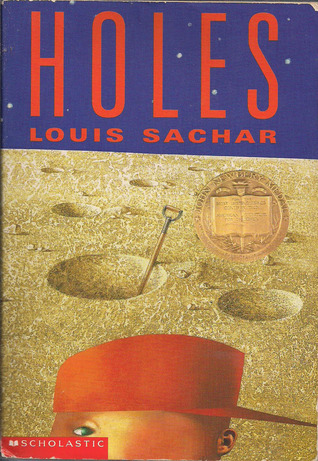 Holes
Holes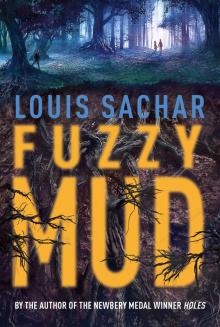 Fuzzy Mud
Fuzzy Mud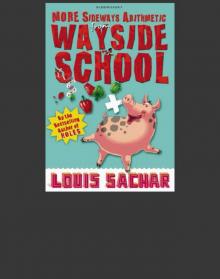 More Sideways Arithmetic From Wayside School
More Sideways Arithmetic From Wayside School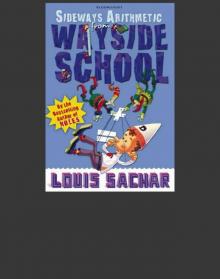 Sideways Arithmetic From Wayside School
Sideways Arithmetic From Wayside School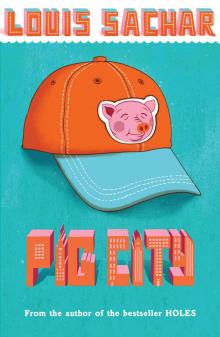 Pig City
Pig City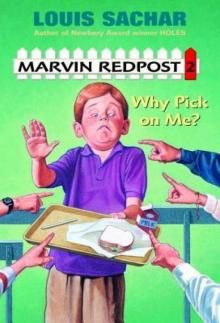 Why Pick on Me?
Why Pick on Me? The Boy Who Lost His Face
The Boy Who Lost His Face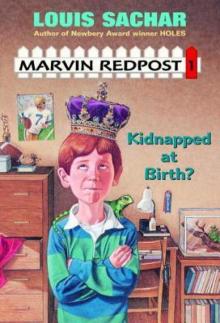 Kidnapped at Birth?
Kidnapped at Birth?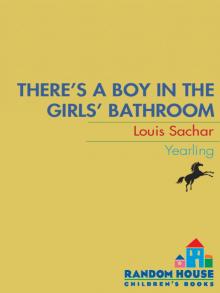 There's a Boy in the Girls' Bathroom
There's a Boy in the Girls' Bathroom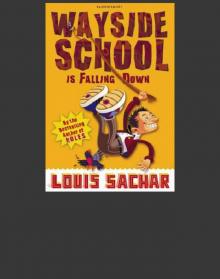 Wayside School Is Falling Down
Wayside School Is Falling Down Stanley Yelnats' Survival Guide to Camp Green Lake
Stanley Yelnats' Survival Guide to Camp Green Lake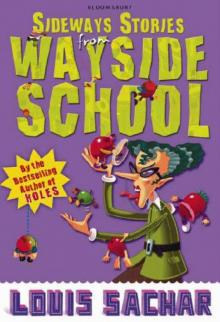 Sideways Stories from Wayside School
Sideways Stories from Wayside School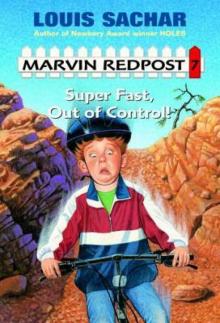 Super Fast, Out of Control!
Super Fast, Out of Control!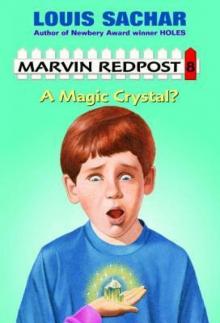 A Magic Crystal?
A Magic Crystal?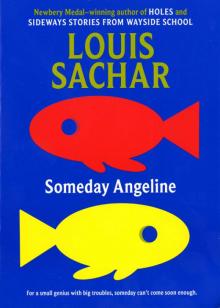 Someday Angeline
Someday Angeline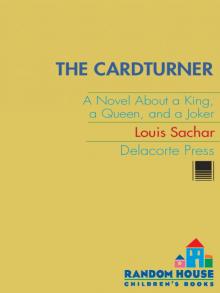 The Cardturner: A Novel About Imperfect Partners and Infinite Possibilities
The Cardturner: A Novel About Imperfect Partners and Infinite Possibilities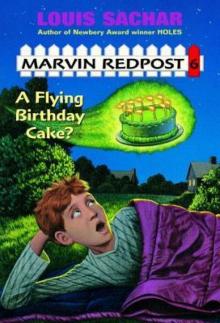 A Flying Birthday Cake?
A Flying Birthday Cake?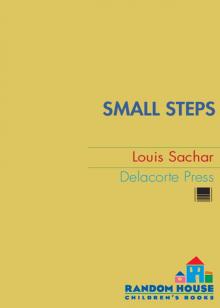 Small Steps
Small Steps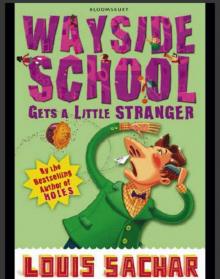 Wayside School Gets a Little Stranger
Wayside School Gets a Little Stranger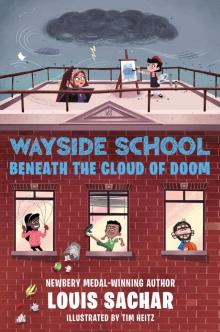 Wayside School Beneath the Cloud of Doom
Wayside School Beneath the Cloud of Doom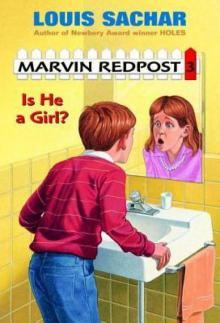 Is He a Girl?
Is He a Girl? Dogs Don't Tell Jokes
Dogs Don't Tell Jokes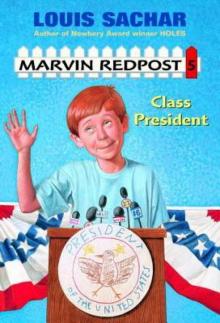 Class President
Class President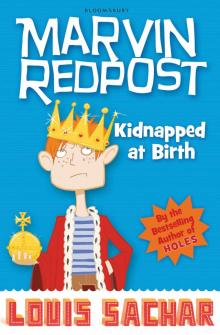 Kidnapped at Birth
Kidnapped at Birth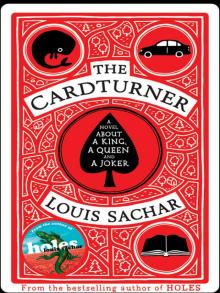 The Cardturner
The Cardturner Stanley Yelnats' Survival Guide to Camp Greenlake
Stanley Yelnats' Survival Guide to Camp Greenlake